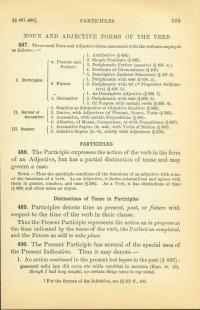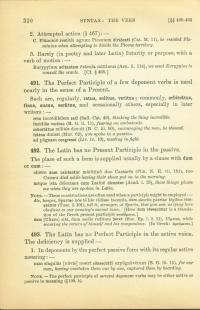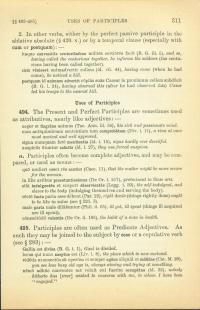488. The participle expresses the action of the verb in the form of an Adjective, but has a partial distinction of tense and may govern a case.
Note— Thus the participle combines all the functions of an adjective with some of the functions of a verb. As an adjective, it limits substantives and agrees with them in gender, number, and case (§ 286). As a verb, it has distinctions of time (§ 489) and often takes an object.
489. Participles denote time as present, past, or future with respect to the time of the verb in their clause. Thus the present participle represents the action as in progress at the time indicated by the tense of the verb, the perfect as completed, and the future as still to take place.
490. The present participle has several of the special uses of the present indicative. Thus it may denote—
- An action continued in the present but begun in the past (§ 466).
Quaerentī mihi iam diū certa rēs nūlla veniēbat in mentem (Fam. 4.13)
Though I had long sought, no certain thing came to my mind. - Attempted action (§ 467).
C. Flāminiō restitit agrum Pīcentem dīvidentī. (Cat. M. 11)
He resisted Flaminius when attempting to divide the Picene territory. - Rarely (in poetry and later Latin) futurity or purpose, with a verb of motion.
Eurypylum scītantemōrācula mittimus (Aen. 2.114)
We send Eurypylus to consult the oracle.
[cf. § 468]
491. The perfect participle of a few deponent verbs is used nearly in the sense of a Present. Such are, regularly, ratus, solitus, veritus; commonly, arbitrātus, fīsus, ausus, secūtus, and occasionally others, especially in later writers.
rem incrēdibilem ratī (Sall. Cat. 48)
thinking the thing incredible
īnsidiās veritus (B. G. 2.11)
fearing an ambuscade
cohortātus mīlitēs docuit (B. C. 3.80)
encouraging the men, he showed
Īrātus dīxistī (Mur. 62)
You spoke in a passion.
ad pūgnam congressī (Liv. 4.10)
meeting in fight
492. The Latin has no present participle in the passive. The place of such a form is supplied usually by a clause with dum or cum.
Obiēre dum calciantur mātūtīnō duo Caesarēs (Plin. N. H. 7.181)
Two Cæsars died while having their shoes put on in the morning.
Mēque ista dēlectant cum Latīnē dīcuntur (Acad. 1.18)
Those things please me when they are spoken in Latin.
Note— These constructions are often used when a participle might be employed.
dīc, hospes, Spartae nōs tē hīc vīdisse iacentīs, dum sānctīs patriae lēgibus obsequimur (Tusc. 1.101)
tell it, stranger, at Sparta, that you saw us lying here obedient to our country's sacred laws.
[Here dum obsequimur is a translation of the Greek present participle πειθόμενοι.]
dum [Ulixēs] sibi, dum sociīs reditum parat (Hor. Ep. 1.2.21)
Ulysses, while securing the return of himself and his companions.
[In Greek: ἀρνύμενος.]
493. The Latin has no perfect participle in the active voice. The deficiency is supplied—
- In deponents by the perfect passive form with its regular active meaning.
Nam singulās [nāvīs] nostrī cōnsectātī expūgnāvērunt. (B. G. 3.15)
For our men, having overtaken them one by one, captured them by boarding.Note— The perfect participle of several deponent verbs may be either active or passive in meaning (§ 190.b).
- In other verbs, either by the perfect passive participle in the Ablative Absolute (§ 420, Note) or by a temporal clause (especially with cum or postquam).
Itaque convocātīs centuriōnibus mīlitēs certiōrēs facit. (B. G. 3.5)
And so, having called the centurions together, he informs the soldiers.
(the centurions having been called together)Cum vēnisset animadvertit collem. (id. 7.44)
Having come (when he had come), he noticed a hill.Postquam id animum advertit cōpiās suās Caesar in proximum collem subdūcit. (B. G. 1.24)
Having observed this (after he had observed this) Cæsar led his troops to the nearest hill.



